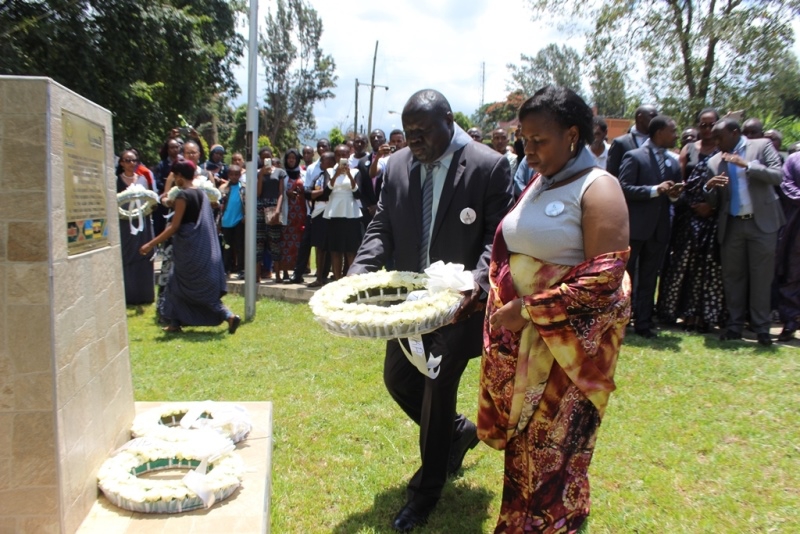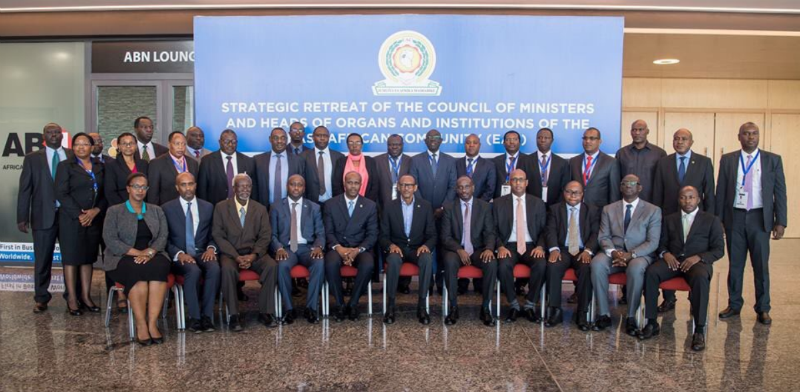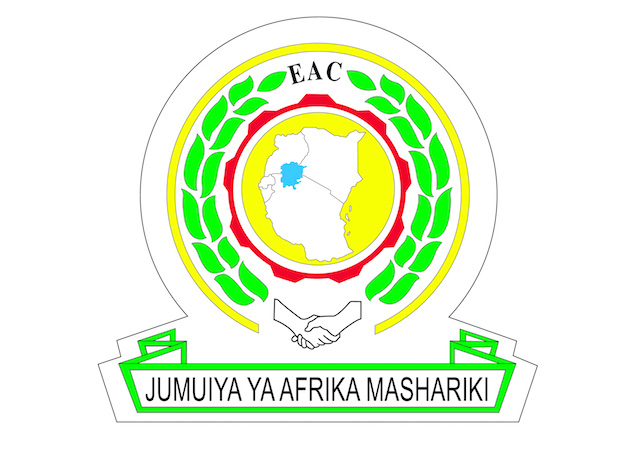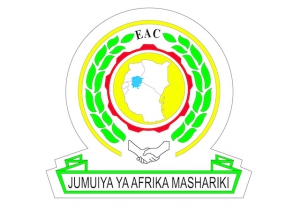
EAC Commemorates 25 Years of the Genocide against the Tutsi
- The Commemoration event took place at the EAC headquarters on 7th April, 2019 and was attended by 400 people largely students from nearby secondary schools and universities, Staff from EAC and United Nations International Residual Mechanism for Criminal Tribunals (UN IRMCT) members of Rwanda Community in Arusha- Moshi and friends of Rwanda;
- The Commemoration event was preceded by a Walk to remember and laying of wreaths on the Commemoration monument at the EAC gardens.
- The Longido District Commissioner, Mr. Frank Mwesumbe who represented the government of United Republic of Tanzanian stressed that it is the duty of everyone in the world in our various capacities, to spare no efforts in fighting against genocide ideology in all ways of its manifestation. He emphasized the importance of actively involving the youth in all affairs as they constitute a big population and equipping them with necessary skills needed to develop their countries but also educating them about the dangers of harboring such ill motives and backward destructive ideologies like genocide ideology, revisionism and divisionism.
- The main discussant Hon. Fred Mukasa Mbidde, member of East African Legislative Assembly (EALA) from Uganda presented about the role of politicians in curbing genocide ideology and ensuring peaceful co-existence in which he highlighted the misdeeds of the genocide government and commended the current government of Rwanda led by H.E Paul Kagame for the many economic miracles, recovery and harmonious living amongst Rwandans. He said that as EAC commemorate the genocide against the Tutsi the region should be happy for what Rwanda has achieved so far especially for turning around the country where its mention in any international sphere is equated to growth, peace, development and visionary leadership. He emphasized that solving genocide is also equal to solving state of affairs by putting everything to do with politics of exclusion and ethno classes out of our political equation. Thus, Rwanda should take credit for what they have achieved in their response to genocide. He further strongly called on EAC Partner States to support Rwanda’s bid to restoring Peace and stability by prosecuting or extraditing a huge number of genocide perpetrators reported to be hiding in the EAC region. He emphasized that in the EAC oneness, EAC Partner States should be happy of what their neighbor nations in the region are doing rather than masterminding wars and creating unnecessary insecurity blunders in an effort to destabilize the other nations and thus fomenting genocidal conducive environment. He concluded by strongly recommending that EAC Partner States should swallow their pride and agree to establish a protective wall against anything that might lead to genocide happening again anywhere in the EAC region.
- On his part, Hon. Christophe Bazivamo who represented the EAC Secretary General reminded the audience that it was at this time of the year in 1994 that the world witnessed the beginning of one of the most horrible atrocities in the Human history. He said that in only 100 days over a million of innocent men and women lost their lives as the world watched in total inactivity. Yet, we all know that we are all created equal and have the right to life and that no one has a right to take another person's life. He however added that though Rwanda has made tremendous strides to rebuild the societal fabric and create pragmatic pace for healing where the impossible became possible and the unexpected became reality, Rwanda has yet fully recovered from this barbaric act. He reminded the audience that the commemoration by EAC Secretariat call for the region to keep on supporting Rwanda on its path to total healing and also at the same time care about genocide and fight against its ideology because what happened in Rwanda in 1994 and its consequences can happen anyway in the EAC Community if people do not stand and vehemently own the fight against it together as one people working for one destiny. He recalled the chronology followed by EAC to directly own the commemoration processes at regional level. EAC recognized the genocide as a crime against humanity and erected a monument in the EAC gardens and set April 7th every year in the calendar as a special day for commemoration of the genocide against the Tutsi. Currently, EAC is considering possibilities for setting the day as an EAC day for commemoration and setting aside a budget in the EAC annual budgets.
- Ms. Tembile who represented UN IRMCT recalled the importance of commemoration to reaffirm the commitment to stop and prevent genocide. She said that the International community salute and recognize the courage of those who stopped the genocide and provided immediate support to genocide survivors. She further noted that the International Community’s direct contribution came in form of setting up an Intentional Criminal Tribunal Court for Rwanda to bring the genocide perpetrators to book and thus promote rule of law. In addition, the International Community also in unison declared the Genocide against the Tutsi as a crime against humanity and set the 7th April every year as an International Remembrance Day. She however reminded people that out of 300 genocide perpetrators identified in the EAC region and 805 in Africa, only 100 were apprehended and brought to book and faced justice. She ended her remaks by emphasizing on the pending files of three major genocide perpetrators that the Mechanism is looking forward to deal with any time when the fugitives are arrested.
- Eng. Daniel Murenzi, the Diaspora Chairman called on members of the Rwandese community in Diaspora to embrace Ndumunyarwanda program as a unifying factor for all Rwandans across the globe, and harness the fight against genocide ideology.
- Eng. John Kizito, who represented the Rwanda High Commissioner in Tanzania, recounted how Rwanda government has restored the broken Society fabric in the last 25 years through unity and reconciliation and the invisible hand of the international community in the 1994 Genocide against the Tutsi and called them all to stand against genocide ideology by responding to indictments, enacting and enforcing laws that fight impunity, Genocide revisionism and denial. He emphasized that this can be possible if done through Young people who constitute a very big force to reckon with in every life aspects.
-
-ENDS-
For more information, please contact:
Mr Owora Richard Othieno
Head, Corporate Communications and Public Affairs Department
EAC Secretariat
Arusha, Tanzania
Tel: +255 784 835021
Email: OOthieno [at] eachq.orgAbout the East African Community Secretariat:
The East African Community (EAC) is a regional intergovernmental organisation of five Partner States, comprising Burundi, Kenya, Rwanda, Tanzania and Uganda, with its headquarters in Arusha, Tanzania.
The EAC Secretariat is ISO 9001:2008 Certified


 EAST AFRICAN SCEINCE AND TECHNOLOGY COMMISSION
EAST AFRICAN SCEINCE AND TECHNOLOGY COMMISSION